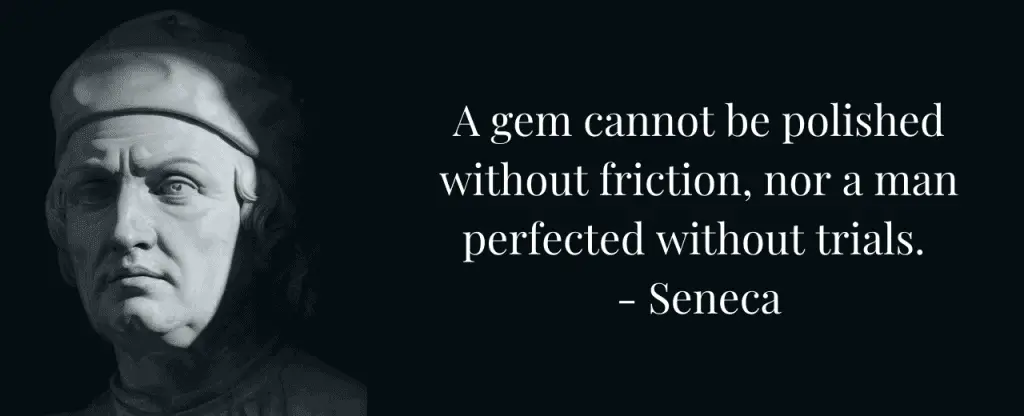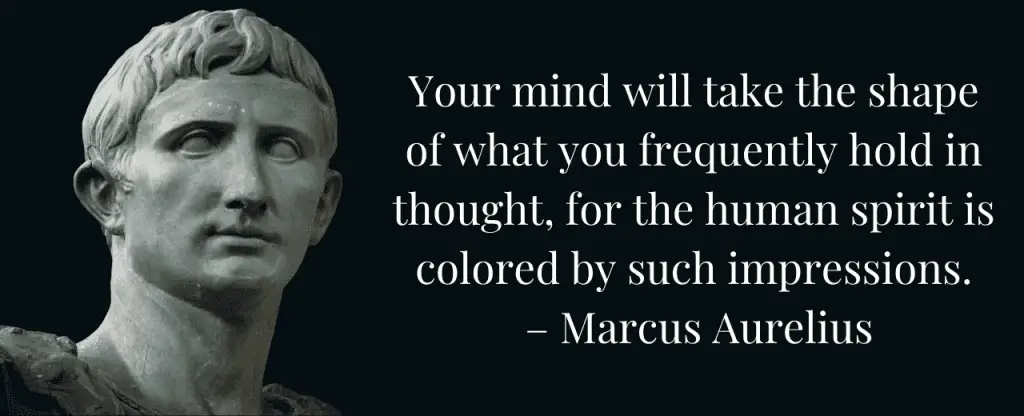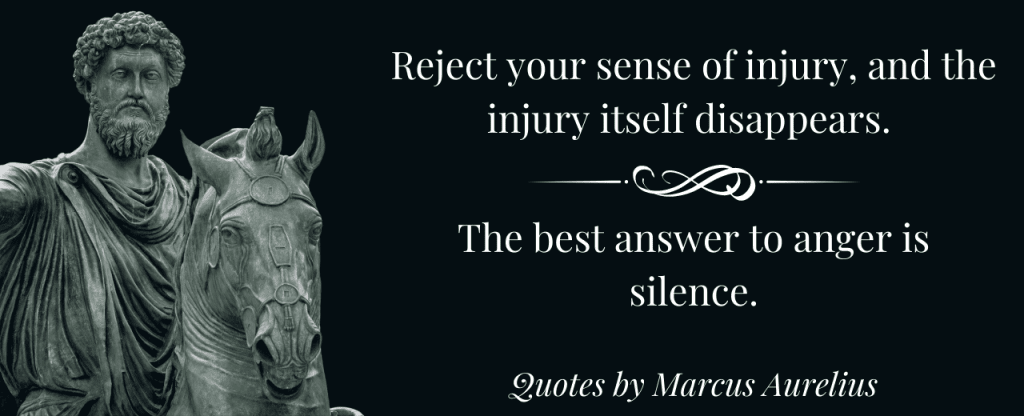If you are a man or exploring your Masculinity, the chances are that you have heard of the ancient philosophy of Stoicism. Unfortunately, some people say Stoicism perpetuates Toxic Masculinity, while others strive for it. After working with men as a teacher, creative coach, and writer on Masculinity, I have seen the impacts of Stoicism, for better and worse.
In this article, I will discuss how Stoic ideals interact with Masculinity: the good, the bad, and the ugly.
What is Stoicism?
Stoicism is an ancient Greek philosophy most commonly associated with the Roman emperor Marcus Aurelius, who wrote of his “Meditations.” Stoicism can be summed up as a set of principles that encourage one to live according to nature and not their emotions.
The idea behind it is that you can have a more peaceful existence by living life without anger or sadness. It’s about living with the strife of life with grace and perseverance.

Stoicism also reminds me of Buddhism in some ways.
When I practice mindfulness and meditation, I find the state of reason, clarity, and calmness to be more available to me. It can allow a deep groundedness.

Below is a list of Stoic Ideals.
Stoic Ideals:
- Reason. Stoics believed that these people should endure significant loss and hardship without such circumstances affecting their ability to make reasoned choices.
- Virtue. The Stoics believed in living morally just lives, being honest to others and themselves, thinking independently, practicing self-discipline, respecting oneself and one’s neighbor; they emphasized freedom from anger.
- Courage. Stoics never compromise their principles and strive to oppose tyranny.
- Self-mastery. The Stoics believed that the most powerful human being was a person who could master his desires, his fears, and all of those other emotions.
- Calm. Stoics are emotionally stable in the face of both good and bad events. With good fortune, they do not indulge in extreme emotions but reflect that unexpected changes can occur at any time. Likewise, a Stoic remains calm when faced with adversity and doesn’t let the event get them down entirely or swear against their fate.
- Preparedness. Stoicism is a philosophy that aims to prepare for hardship, which includes living as though one were poorer to stay humble.
- Love of fate. Stoics do not try to escape their misfortune but rather welcome them because it gives them a chance to challenge themselves and become better people.
In the rest of this article, we will explore how Stoic Philosophy is used in men’s work and whether it encourages toxic Masculinity or admirable traits.
Is Stoicism a form of Toxic Masculinity?
Stoicism is not a form of Toxic Masculinity, but it is often misused to justify toxic behaviors. Stoicism at its core is about utilizing self restaurant and emotional control, whereas Toxic Masculinity is about repressing and denying feelings. It’s a subtle but essential difference.
There are a lot of reasons I love Stoic Philosophy. Reading the above list of Stoic Ideals, you can see that there is wisdom in parts of the theories.
The issue in Men’s work is many people use the philosophy to justify toxic behaviors.
I have seen famous stoic quotes like this all the time:

There is some wisdom in this, but it is so easy to take this wrong. To use these words as fancy ways of saying you should repress your emotions – that silent suffering is “manliness.”
I have seen men and women look towards Stoicism as ancient and pure wisdom. I was not thinking about the subtleties of how you would translate it into modern life or using it as a form of spiritual bypassing.
A study printed in the Journal of Interpersonal Violence has show people who identify as Stoic acted “out their pent-up emotions on relational partners by provoking conflict and/or engaging in partner-directed violent and aggressive behaviors.”
Another study found a link between Stoicism and negative attitudes towards poverty.
Both studies show how Stoic Philosophy has been linked to behaviors that could be defined as toxic Masculinity.
Stoicism can support the problems with traditional Masculinity. They can make men feel a need to be rational and indifferent to crises at all times. The ideal man embodies those qualities alongside competitiveness, dominance, and aggression.
But… I don’t think it’s Stoicism that does it.
I think it’s how people practice it.
Stoicism is an Advanced Emotional Technique
Stoicism, when appropriately used, is a very valuable tool. The problem is it’s a level three technique, not level one.
At its core, Stoicism is about emotional intelligence. It can help you find calm in a chaotic world. But it isn’t about repressing your emotions; it’s about wielding them.
Here are three scenarios.
Scenario One: Disaster
House is burning, and the cat is lost. You’re filled with so much anxiety you start running around. You run towards the fire for the cat. After frantically looking, you collapse in tears. The fire department never gets called. The situation makes you spiral down into depression and grief.
Scenario Two: Suppression
House is burning, and the cat is lost. You breathe deep and numb yourself to the situation so that you can think logically. You find yourself in “task” mode. Call the fire department, and start looking for the cat. After the fire, you begin planning to rebuild. The whole time you stayed calm and collected.
Scenario Three: Unshakable
House is burning, and the cat is lost. You feel the emotions welling up inside you—all the pain and loss. You breathe deep and know that now is not the time. You know there are important tasks and will come back to the emotions once the problems are dealt with.
Call the fire department, and start looking for the cat.
After the fire, you begin to grieve and give yourself space to feel the emotions of loss fully.
The point of these scenarios is to show the difference between being ruled by your emotions, suppressing your feelings, or knowing how to manage them properly.
Most people can not skip from Level one or two to level three easily. It takes an immense amount of work to understand how you get triggered, how you deal with stress, and most importantly, how you can move through it in a healthy way when the time is right.
The problem most Stoics have is they just keep suppressing their emotions until the pressure explodes. It can then become a pattern of violence and toxic behavior.
Stoicism isn’t about suppressing emotions; it’s about learning to wield them.
That’s Jedi-level emotional training.
Stoicism: The good and the bad
Stoicism isn’t good or bad, but a philosophy that can be used to good or bad effect. For example, Stoicism can be used as an excuse, or spiritual bypassing, to not deal with painful emotions. Stoicism can also be used to help someone become self-reliant and emotionally stable.
An excellent 2020 paper on Stoicism as Emotional Compression presents the case that Stoicism is a positive masculine trait if done right.
“I argue that the social norms around stoicism and restricted emotional expression are masculine-coded forms of emotional labor.” Olúfẹ́mi O. Táíwò
The author, Olúfẹ́mi O. Táíwò, presents the case of Emotional Labor. The idea is that relationships have a power dynamic over who takes on the anxiety, the shame, the worry, and the emotional baggage. A healthy relationship is when everyone takes on their part.
Stoicism could be seen as a way of taking on that emotional weight. It could be used as a tool to take the burden and process it when the time is right.
If used properly, this can be a positive masculine tool.
Stoicism and Masculinity
This begs the question, is Stoicism a masculine trait?
Stoicism is not inherently masculine or feminine. It is a philosophy that anyone can use. However, many of the ideals can be seen as traditional masculine traits. That is why many men use the philosophy as a way of connecting to their Masculinity.
The ideals of reason, self-mastery, and preparedness have been viewed as positive masculine traits. However, there is a lot to learn about these virtues through stoic philosophy and the writings of Marcum Aurelius.
Learn more with my article on the definition of Masculinity
In Conclusion:
Stoicism is a fantastic philosophy with unique wisdom that can help men cultivate Masculinity. Its ideals are helpful for anyone that wants to live a more harmonious life.
The danger comes when the philosophy is used to support or justify toxic masculine behaviors. Stoicism is an advanced emotional technique and should be used in conjunction with developing emotional awareness and intelligence.
I have greatly appreciated the lessons I learned by reading Marcus Aurelius’s Meditations. The book came to me at a time that was full of heartache and broken dreams. Yet, it gave me the courage and insight to better myself.
I definitely found myself overcompensating and dulling my emotions by misinterpreting Stoic thought. That is why I wanted to write a cautionary tale of the philosophy while also highlighting its benefits.




